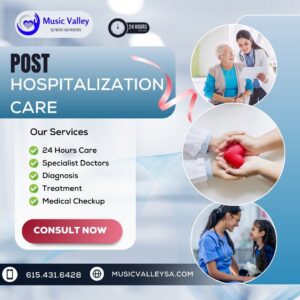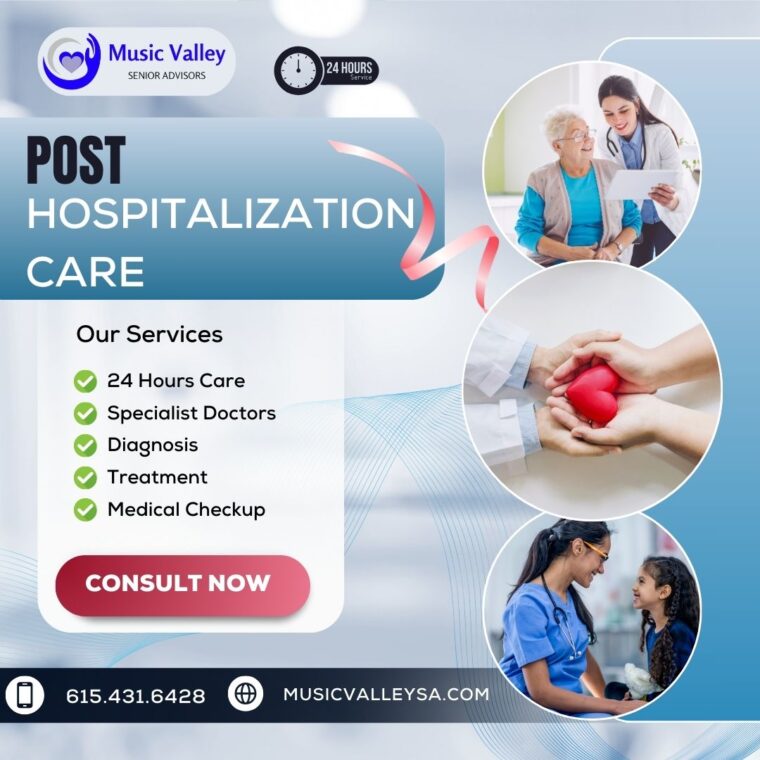After a hospital stay, the right care is key for getting back to normal. When you’re older, this matters even more. Once leaving the hospital, elderly individuals often need extra support during their recovery at home.
Post hospitalization care is the crucial bridge between hospital treatment and full recovery. It’s a phase often overlooked, yet it can make or break your healing process. Whether you’re a patient, a caregiver, or simply planning for the future, understanding the ins and outs of post-hospital care is essential for ensuring the best possible outcomes.
This might include help with day-to-day tasks or managing health needs. Having someone there can prevent trips back to the hospital and help regain independence faster. Good post hospital care can truly shape how well an older person recovers after they come home from being in the hospital bed.
This functional decline may lead to permanent disability.

Why Post Hospital Care Is Crucial for Recovery
After you leave the hospital, post hospital care is key for your health. For older adults especially, this type of care helps a lot with recovery. Older people often have more than one health issue and need extra time to get better after being sick.
Without enough days in the hospital due to costs, they might not heal fully. Receiving proper treatment outside a medical center lets patients keep getting the right Post Hospitalization Care once acute illness treatments are done. This support aims at helping them regain their independence just like before they got into the hospital.
After an acute illness and short stay in a hospital. A large number of old individuals lose some daily living skills or face things like memory problems or sadness when back home.
Many go home but then don’t receive any further assistance. Those who can’t bounce back well may end up returning to hospitals or moving permanently into long-term care homes. So yeah, building strong systems for taking good care of older adults following their release from hospitals makes sense.
Music Valley Senior Advisors improves lives by reducing disabilities caused by ageing while easing off pressure on families too.
Assessing patient’s medical requirements
Post-hospital care begins with a thorough assessment of the patient’s medical needs. This evaluation includes:
- Reviewing discharge instructions
- Identifying medication requirements
- Assessing wound care needs
- Determining necessary medical equipment
| Assessment Area | Key Considerations |
| Medications | Dosage, schedule, side effects |
| Wound Care | Dressing changes, infection prevention |
| Equipment | Oxygen, mobility aids, monitoring devices |
Understanding these requirements ensures a tailored Post Hospitalization Care plan for optimal recovery.
Top Tips for Elderly Care After Hospital Discharge
After you get home from the hospital, it’s important to have everything ready. If your surgery was planned, ask about after-care during your pre-op meeting. Find out what medicines are needed, diet changes and therapy sessions like physical or speech therapy.
If the stay in the hospital was sudden, don’t worry! Before you leave, nurses will tell you how to take care of yourself at home. You might need help with daily tasks.
Don’t hesitate to ask family and friends for support with things like cooking or shopping. Sometimes a helping hand isn’t around, this is when Right at Home professionals like Music Valley can step in. They’ll do chores that may be hard while recovering.
Also think ahead about rides because there will be doctor visits later on. And don’t forget getting medicine and food too! Make sure someone can drive if moving is tough for you right now.
Make your house safe before arriving back. From clearing walkways to putting up railings where needed. And stock up on stuff: bandages for wounds or any medical equipment doctors say should be used during recovery time. Having someone look after personal needs. From dressing oneself down to meals.
Is real comfort when healing at home. Lastly remember emotional company matters just as much. It truly helps heal one’s spirit along with their body.
A. Coordinating with healthcare providers
Effective coordination with healthcare providers is crucial for elderly care after hospital discharge. Here’s a list of key steps:
- Schedule a discharge meeting
- Obtain detailed care instructions
- Clarify medication regimens
- Discuss potential complications
| Provider | Role | Contact Frequency |
| Primary Care | Oversee overall health | Weekly |
| Specialist | Address specific conditions | As needed |
| Home Health | Provide in-home care | Daily/Weekly |
B. Scheduling follow-up appointments
After Hospital Care: Ensuring Elderly Wellness
When your older loved one comes home after a hospital stay, they need extra care. Their body isn’t as strong and getting back to normal can be hard. DispatchHealth gives help for these tough times with medical pros who come when you need them.
In the days after leaving the hospital, seniors face many challenges. Hospitals are scary places that sometimes make people sicker instead of better because of germs like coronavirus (COVID-19). When old individuals get this virus, it’s really bad news, their bodies often can’t fight as well.
They must follow health tips at home to heal right but may forget how due to tiredness or confusion from being sick so long in bed. This makes things risky – they might not eat enough or take their medicines correctly without someone checking on them. Also watch out for signs of COVID-19 if it was caught during the hospital visit – staying alert helps keep them safe!
Home Care Essentials After a Hospital Stay
After leaving the hospital, you’ve got a big job: to keep getting better at home. You might need special stuff like medicines or tools that help you move around safely. Start by figuring out how to get back from the hospital.
Maybe a friend can drive you, or maybe the hospital will call a taxi for you. Once home, think about your space. Make sure it’s easy for you to rest and do day-to-day things without trouble.
If stairs are tough after surgery, set up a cozy spot on one floor with everything close by. Talk with your doctor before heading out of the hospital doors. They’ll tell what medicines to take and when they’ll want to see you again for check-ups.
Try asking if there’s any way to avoid going all over town to pick up pills. Some hospitals may let you grab the medicine right then as you leave, rather than waiting for a later visit to the pharmacy. Be extra careful checking these drugs cause mix-ups happen pretty often sad but true so clear doubts while still under care pros where safe sound no rush quick answers waiting room!
Always double-check those prescriptions and ask questions if anything seems off. You don’t want any mistakes once get inside house alone managing own health lot mind already why risk confusion top?
Post Acute Care Services That Transform Recovery
When you leave the hospital, your recovery journey isn’t over. Post-acute care services play a key role in getting back to normal life. They come in four main types: long-term care hospitals (LTCHs) manage severe cases like those needing ventilator support.
Skilled nursing facilities (SNFs) offer less intense help, and home health agencies provide care at your place for convenience. Each service has specialists trained for specific needs. Like helping you walk again or managing serious wounds.
The teams work hard so that one day, whether it’s about enjoying time with family or going back to work, you can do those things again. These caregivers stick by your side until they see progress. A patient walking their dog after being bed-bound is proof enough!
Plus, working closely with these experts helps keep individuals from having to go back into the hospital because of better oversight and targeted treatments. This team approach also saves money since fewer complications mean lower medical costs overall. An added bonus on top of great quality care focused just on what each person uniquely needs
How to Support Elderly After Hospital Discharge
After your loved one leaves the hospital, help them get enough rest. Set up a sleep routine to improve their slumber. Check that where they snooze is quiet and cozy too.
Healthy foods are key for energy and recovery. Encourage eating plenty of veggies, fruits, whole grains, and lean meats. Help with cooking if needed based on care instructions they got when leaving the hospital.
Make sure seniors drink water often during the day to stay energetic. If okayed by a doctor or post-care plan, light exercise can boost health after coming home from a stay in the hospital. Like easy stretches or short walks.
And build up as able. Chatting helps too, offer support while elders adjust back at home so they don’t feel alone with worries or stressors linked to their recent hospital visit. Stay on track with meds!
Skilled nurses might be part of your team. They’re great at setting schedules for medicine times and doling out doses as prescribed. Always chat with doctors about med questions!
Lastly but crucially: Arrange visits to checkups promptly once discharged according to what was set before leaving.
A. Assisting with daily activities
- Bathing and dressing
- Meal preparation
- Medication management
- Light housekeeping
B. Ensuring proper hygiene and grooming
Personal hygiene is crucial for recovery and dignity. Assist with:
- Daily bathing or sponge baths
- Oral care
- Hair brushing and styling
- Nail care
| Task | Frequency | Importance |
| Bathing | Daily | High |
| Oral care | 2-3 times daily | High |
| Hair care | Daily | Medium |
| Nail care | Weekly | Low |
Home Care vs. Post Acute Care: What’s Best?
Choosing between home care and post-acute care in a facility is tough. Here’s what you should know. When you leave the hospital, if you go to a skilled nursing place, they watch over you 24/7.
That means professionals are always there to handle problems quickly. But let’s say you pick home care instead. You might see nurses or therapists for just an hour sometimes during the week.
Medicare pays for some of this but not all day, every day like at the nursing place. Researchers found that it costs Medicare less when individuals get cared for at home after leaving the hospital. It saves around $5,000 over two months compared to staying in a skilled nursing spot, which can cost about $8,600 each month.
However even though saving money sounds good remember those who recover back at their house tend to end up back in hospitals more often. At your own pad, only family or aides without medical training help out most times, and these helpers may miss signs of health issues because they’re not trained Post Hospitalization Caregivers. Spending extra money on full-time professional attention could prevent patients from needing emergency visits again. Getting better with round-the-clock aid might be worth it, as readmission chances drop and stress isn’t piled onto family members.
Difference between Home Care vs. Post Acute Care
Post acute care facilities offer specialized medical services, while home care provides familiar surroundings and personalized attention. The choice depends on the patient’s needs, recovery goals, and support system.
| Aspect | Home Care | Post Acute Care |
| Environment | Familiar | Clinical |
| Medical Support | Limited | Extensive |
| Personalization | High | Moderate |
| Cost | Variable | Often higher |
Steps to Smooth Recovery After Hospital Stay
To make coming home from the hospital smooth, ask a friend or family member for help. They can get things ready at your house by doing stuff like cleaning and moving big items out of the way. Speak to them often about what you need as you get better.
Make sure your house is safe for when you return. Start with making enough space to move around easily by moving furniture and getting rid of any tripping hazards like loose rugs or wires on the floor. Put up lights where it’s dark, add rails in important spots, and use mats that don’t slip so you won’t fall down.
Also set up your bathroom with support bars near toilets or showers if needed. Think about equipment that might make life easier like tools to help grab things without bending over too much. Have healthy food ready at home along with all medicines prescribed by doctors including different medical supplies required post surgery/illness.
Set reminders for taking pills correctly through phone apps or organizers if necessary! Seeking buddies who can walk this path alongside makes a world of difference whether they’re dropping off meals driving places side-by-side emotional encouragement share load. Plus hire professional care services attend personal needs drug handling mobility aid – especially early days recuperation.
Lastly keep bedroom comfy because loads rest sleep essential healing part equip bed setup addresses situation be it temporary rental lasting investment safety comfort top priority mind always! Remember these steps aren’t just helpful now but also good long-term ideas. They’re particularly important for seniors planning to stay in their homes longer, ensuring ease of mind and wellbeing for the future.
Creating a Comfortable Environment
- Prepare the home for safety and comfort
- Set up a recovery area with essentials
- Ensure proper lighting and ventilation
Establishing a Daily Routine
| Time | Activity |
| Morning | Medication, light exercise |
| Afternoon | Rest, therapy sessions |
| Evening | Relaxation, social interaction |
Implementing Medication Management
- Organize prescriptions
- Set reminders for dosage times
- Monitor for side effects
Expert Tips on Post Hospitalization Care for Elderly
Before your elderly family member leaves the hospital, get to know their discharge plan well. Talk with the doctors and nurses to understand what medications they need and when their next doctor visits are. You will use this info at home.
Next, think about how much help your loved one needs for moving around or taking a bath. If it’s too much for you alone, look into getting someone who can come to your house and take care of them or find a good place where professionals take care of older people. You might be able to talk with a “care coordinator” from the hospital.
They can inform you about special equipment and nearby services that can make life safer at home. Also very important: Make sure all medicines are clear. What each one is for, how much should be taken every day.
This prevents mix-ups back at home. If your relative will live again in their own house after leaving the hospital, check if anything needs changing there to keep accidents away. Like adding handles or ramps which make walking easier if needed.
Tracking vital signs and symptoms
Regular monitoring of vital signs is crucial for post-hospitalization recovery. Keep a daily log of:
- Temperature
- Blood pressure
- Heart rate
- Respiratory rate
Watch for symptoms like:
- Pain
- Swelling
- Shortness of breath
| Vital Sign | Normal Range |
| Temperature | 97.8°F – 99°F |
| Blood Pressure | 90/60 – 120/80 mmHg |
| Heart Rate | 60-100 bpm |
| Respiratory Rate | 12-20 breaths/min |
Sometimes an older person requires medical attention even after going back home, Professional health workers can give treatments right there instead of having regular trips back to hospitals. For those who may need more than just occasional assistance, consider looking into places designed for elder living, such as assisted homes, but choose ones that respect individual wishes. Lastly, don’t forget legal preparations and explore financial options like insurance through Medicaid programs.
You’re home from the hospital, but your recovery journey is just starting. Set up a comfy space to rest and keep all your medicines organized. Make sure you’ve got someone to help you with meals and moving around if needed; don’t push yourself too hard!
Follow your doctor’s instructions closely, schedule follow-up appointments, and ask lots of questions when something isn’t clear. If any new pains or symptoms pop up, get on the phone with your healthcare team right away. Take care of yourself – steady progress beats rushing it!




